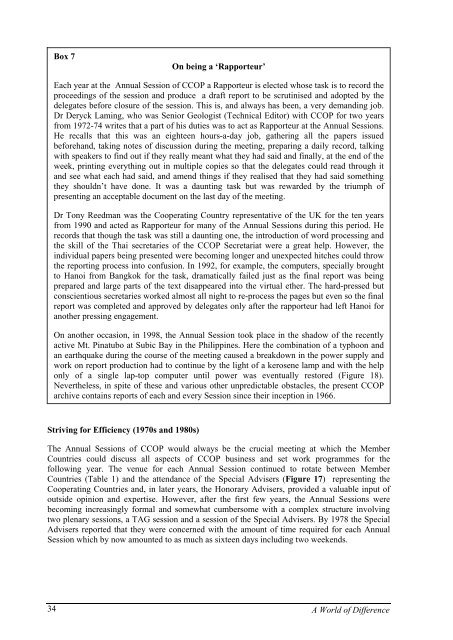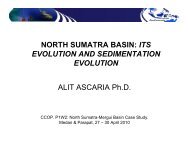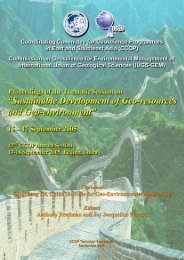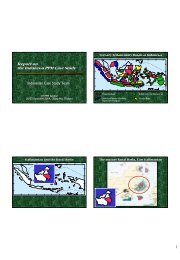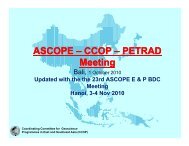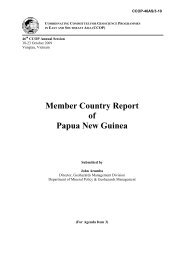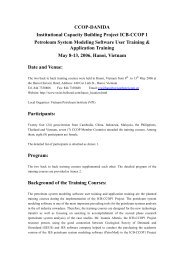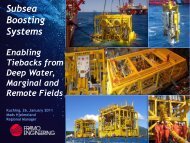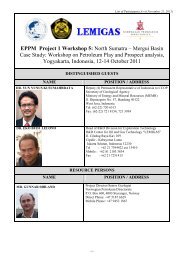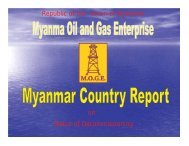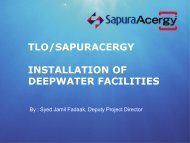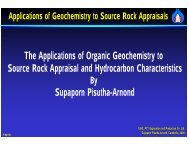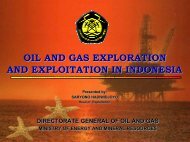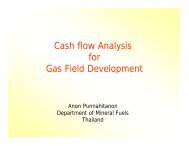Forty Years Of The Coordinating Committee For Geoscience - CCOP
Forty Years Of The Coordinating Committee For Geoscience - CCOP
Forty Years Of The Coordinating Committee For Geoscience - CCOP
You also want an ePaper? Increase the reach of your titles
YUMPU automatically turns print PDFs into web optimized ePapers that Google loves.
Box 7<br />
On being a ‘Rapporteur’<br />
Each year at the Annual Session of <strong>CCOP</strong> a Rapporteur is elected whose task is to record the<br />
proceedings of the session and produce a draft report to be scrutinised and adopted by the<br />
delegates before closure of the session. This is, and always has been, a very demanding job.<br />
Dr Deryck Laming, who was Senior Geologist (Technical Editor) with <strong>CCOP</strong> for two years<br />
from 1972-74 writes that a part of his duties was to act as Rapporteur at the Annual Sessions.<br />
He recalls that this was an eighteen hours-a-day job, gathering all the papers issued<br />
beforehand, taking notes of discussion during the meeting, preparing a daily record, talking<br />
with speakers to find out if they really meant what they had said and finally, at the end of the<br />
week, printing everything out in multiple copies so that the delegates could read through it<br />
and see what each had said, and amend things if they realised that they had said something<br />
they shouldn’t have done. It was a daunting task but was rewarded by the triumph of<br />
presenting an acceptable document on the last day of the meeting.<br />
Dr Tony Reedman was the Cooperating Country representative of the UK for the ten years<br />
from 1990 and acted as Rapporteur for many of the Annual Sessions during this period. He<br />
records that though the task was still a daunting one, the introduction of word processing and<br />
the skill of the Thai secretaries of the <strong>CCOP</strong> Secretariat were a great help. However, the<br />
individual papers being presented were becoming longer and unexpected hitches could throw<br />
the reporting process into confusion. In 1992, for example, the computers, specially brought<br />
to Hanoi from Bangkok for the task, dramatically failed just as the final report was being<br />
prepared and large parts of the text disappeared into the virtual ether. <strong>The</strong> hard-pressed but<br />
conscientious secretaries worked almost all night to re-process the pages but even so the final<br />
report was completed and approved by delegates only after the rapporteur had left Hanoi for<br />
another pressing engagement.<br />
On another occasion, in 1998, the Annual Session took place in the shadow of the recently<br />
active Mt. Pinatubo at Subic Bay in the Philippines. Here the combination of a typhoon and<br />
an earthquake during the course of the meeting caused a breakdown in the power supply and<br />
work on report production had to continue by the light of a kerosene lamp and with the help<br />
only of a single lap-top computer until power was eventually restored (Figure 18).<br />
Nevertheless, in spite of these and various other unpredictable obstacles, the present <strong>CCOP</strong><br />
archive contains reports of each and every Session since their inception in 1966.<br />
Striving for Efficiency (1970s and 1980s)<br />
<strong>The</strong> Annual Sessions of <strong>CCOP</strong> would always be the crucial meeting at which the Member<br />
Countries could discuss all aspects of <strong>CCOP</strong> business and set work programmes for the<br />
following year. <strong>The</strong> venue for each Annual Session continued to rotate between Member<br />
Countries (Table 1) and the attendance of the Special Advisers (Figure 17) representing the<br />
Cooperating Countries and, in later years, the Honorary Advisers, provided a valuable input of<br />
outside opinion and expertise. However, after the first few years, the Annual Sessions were<br />
becoming increasingly formal and somewhat cumbersome with a complex structure involving<br />
two plenary sessions, a TAG session and a session of the Special Advisers. By 1978 the Special<br />
Advisers reported that they were concerned with the amount of time required for each Annual<br />
Session which by now amounted to as much as sixteen days including two weekends.<br />
34<br />
A World of Difference


